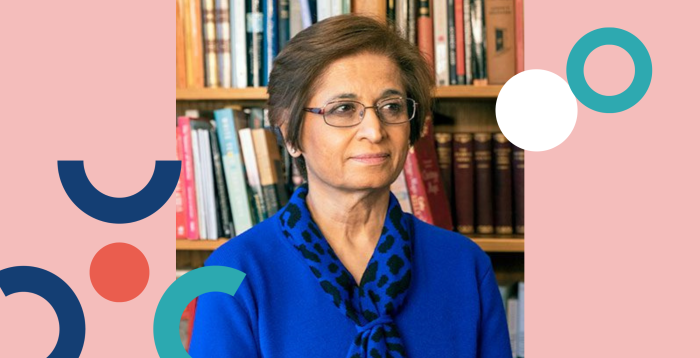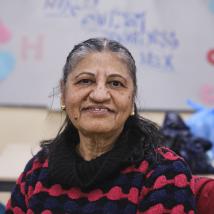For Breast Cancer Awareness Month, Professor Daksha Trivedi shares how her research is collaborating with the Asian Women Cancer Group (AWCG), the East of England Cancer Alliance, and women experiencing breast cancer to gain a deeper understanding of the barriers and enablers in accessing breast cancer care within South Asian communities.

Professor Daksha Trivedi is Principal Investigator of this project and has led many NIHR ARC East of England funded projects, which aim to inform health decision-making.
I am a Professor of Applied Health Research and a Co-Chair of the Public Health Connect Strategy Group at the University of Hertfordshire. My research is focused on developing strategies to actively engage with Black, Asian and Minority Ethnic communities and tackle the growing issue of inequality through research.
I discovered during my own cancer experience that there was little ‘holistic support’ to help me through recovery from life-threatening surgery and beyond. Later, I founded a Macmillan Assisted Cancer Support Group in Bedfordshire and learned about the Asian Women’s Cancer Group (AWCG) in Harrow, which provides culturally relevant support for cancer patients. The women from AWCG were from the same culture as me, so we were able to relate to each other’s experiences. Working with the NHS Cancer Alliance East of England, we identified that there was a need to develop research to support South Asian communities in cancer prevention and care.
“Meeting the needs of South Asian women in cancer care is paramount and working collaboratively with AWCG was a first important step in helping to inform NHS Cancer Services”.
Jai Jayaraman NHS Cancer Alliance, East of England
Understanding the experiences of South Asian women in breast cancer care
Compared to white women, women from ethnic groups are less likely to be aware of breast cancer symptoms or attend breast cancer screenings. This leads to poorer recovery and survival outcomes. Working with Asian Women Cancer Group (AWCG) and the East of England Cancer Alliance, we decided to focus on understanding how healthcare services can improve in supporting South Asian women to engage with breast cancer care, such as seeking and receiving treatment. This will be used to inform recommendations to improve healthcare services. In order to do this, we knew we needed to ask people about their experiences around breast cancer: what went well, what didn’t go well, and what could be done to make it better.
My strong links with South Asian women experiencing cancer were key to working with AWCG. I met with the women in several small meetings to discuss how the AWCG had supported them. We found that there were a number of barriers to accessing breast cancer care, including language difficulties, not knowing what to expect or who to ask about it, and difficulties getting support from family. It was highlighted that there was a lack of cultural understanding e.g. appointment dates conflicting with festivals and activities that South Asian women observe. We also found several facilitators, such as positive relationships with clinicians and being able to draw on support groups (both in person and online). Overall, this project has highlighted the value of culture-specific support groups and developing holistic needs assessments with culturally-specific tools to help improve quality of life and cancer care for South Asian women.
“Working at grassroots level with women who I identified myself with, I was able to connect in a positive way and truly ‘listen’ to their voices.”
Professor Daksha Trivedi, ARC EoE researcher
The value of building trust
Building trust and genuine relationships is key to successful engagement. My approach with the women from AWCG was transparent, authentic, empathetic, and enabling. I was invited to a meeting where I shared my own harrowing cancer journey, which led to discussions around the importance of healthcare professionals understanding specific needs like cultural awareness and support that is appropriate for that culture. In order to tailor your approach when working with people from a variety of cultures, it's critical to start by learning about their needs as well as their everyday experiences. To build trust, we must be authentic and address their concerns rather than our own agendas.
It is also important that researchers, practitioners, and community groups share how everyone benefits from working together and how this positively impacts the wider community. For example, I shared with the group how our collective lived experiences could usefully inform better cancer care, given that we all had experienced gaps in our cancer care and meeting our specific needs. This led to greater engagement from the group.
“It was helpful to take part in the project as it addressed our lived experience, our challenges, and more importantly we worked together to help identify potential solutions. It really was a ‘listening event’ in which our views mattered.”
Anonymous, Asian Women Cancer Group (AWCG) member
Next steps
We have finished data collection and had a feedback session with AWCG participants about the study. We are currently writing up and disseminating the findings, including presenting them to the Asian Cancer Support Group. Our next step is to explore what possible solutions can be taken forward together to address some of the barriers identified. Following this, I am hoping to secure further funding for training workshops with health professionals on how to consider specific cultural needs in cancer care. I hope this research emphasises the benefits of involving service users in improving services, and I am proud that this project contributes to this growing body of research.
If you would like to find out more about our project and co-production approaches, please contact Professor Daksha Trivedi (d.trivedi@herts.ac.uk).
Collaborators in this project: AWCG (Rohini Patel); Nasim Panjwani (Macmillan Trainer and facilitator), Jai Jayaraman (NHS Cancer Alliance East of England); Dr Claire Thompson (University of Hertfordshire)
